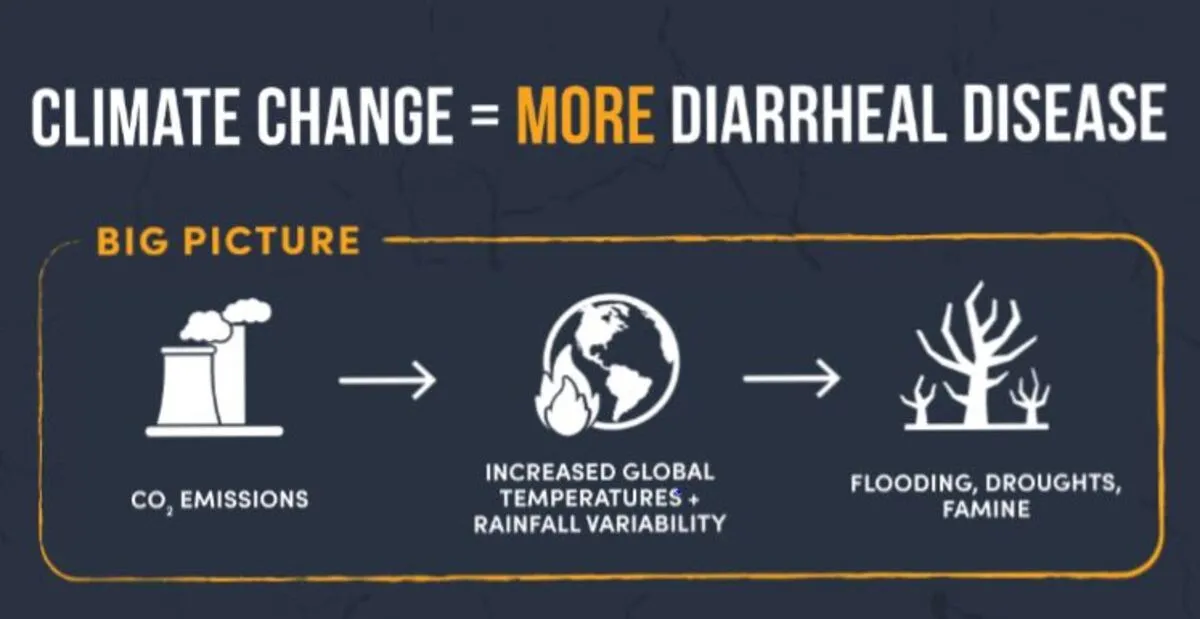Diarrhea, once relegated to the realm of personal discomfort, has unexpectedly become a poignant illustration of the tangible impacts of climate change on our daily lives. Climate change is no longer an abstract concept confined to scientific discussions; it has tangible and far-reaching effects on our daily lives. One of the alarming consequences is the increased prevalence of diarrhea, as highlighted in a recent article by the Indian Express.
Here, we’ll explore the intricate connection between climate change and the rise in diarrhea cases, exploring vulnerable regions, health risks, and potential solutions.
Rising Concern: Diarrhea
Diarrhea, a seemingly mundane ailment, is emerging as a significant concern in the context of climate change. As temperatures rise and weather patterns become erratic, the incidence of diarrhea is on the upswing. This calls for a deeper understanding of the intricate link between these seemingly disparate factors.
Link Between Climate Change and Diarrhea
Scientific evidence points to a direct correlation between climate change and the surge in diarrhea cases. Warmer temperatures create favorable conditions for the proliferation of bacteria and viruses, leading to water and food contamination. The article underscores this connection, drawing attention to the need for proactive measures to address the root cause.
Vulnerable Regions
Not all regions are equally affected by the climate-change-induced surge in diarrhea. Vulnerable areas, often characterized by inadequate sanitation and limited access to clean water, face heightened risks. Identifying these regions is crucial for targeted interventions and resource allocation.
Health Risks and Implications
The health risks associated with frequent diarrhea outbreaks are multifaceted. Beyond the immediate discomfort, persistent diarrhea poses severe health risks, especially for vulnerable populations.

The implications extend beyond individual health, impacting community well-being and straining healthcare systems.
Adaptation and Mitigation Strategies
Efforts are underway to adapt and mitigate the impact of climate change on health. From sustainable water management to climate-resilient infrastructure, various strategies aim to build resilience in the face of changing environmental conditions. Understanding and implementing these measures is paramount.
Role of Technology and Innovation
Technology and innovation play a pivotal role in addressing climate-related health challenges. Advanced monitoring systems, predictive models, and innovative solutions contribute to early detection and effective management of health risks. The article highlights notable examples showcasing the intersection of technology and public health.
Community Engagement
Community involvement is key to combating health issues linked to climate change. Grassroots initiatives that empower local communities to address sanitation, water quality, and healthcare access contribute significantly to building resilience. The article showcases successful community-led projects making a tangible impact.
Government Initiatives
Government policies and initiatives also play a crucial role in tackling climate change impacts on health. Coordinated efforts, stringent regulations, and investments in healthcare infrastructure are essential components of an effective response. The article examines successful government-led interventions and emphasizes the need for sustained commitment.
Challenges Climate-Related Health Issues
Despite progress, challenges persist in addressing the complex interplay of climate change and health. Funding constraints, political barriers, and the global nature of the issue pose obstacles. Acknowledging these challenges is the first step towards developing comprehensive solutions.
Global Collaboration
The interconnected nature of climate-related health challenges necessitates global collaboration. International partnerships, knowledge-sharing, and joint initiatives are crucial for a concerted and effective response. The article highlights successful collaborative endeavors that showcase the potential of unified action.
Call to Action
As the article unfolds the intricate relationship between climate change and diarrhea, it serves as a call to action. Readers are encouraged to take individual and collective steps to address climate change, recognizing its profound impact on global health. Simple actions, from water conservation to supporting sustainable practices, can contribute to a healthier and more resilient world.
Personal Stories
To humanize the issue, the article shares personal stories related to climate change and health. Real-life experiences provide a relatable context, connecting readers emotionally to the broader narrative. These stories underscore the urgency of collective action in safeguarding our health and the planet.
Future Outlook
A vivid picture of potential future scenarios if climate-related health issues remain unaddressed. From escalating health crises to strained resources, the future outlook is grim without proactive measures. The urgency of prioritizing sustainable practices and global cooperation is underscored.
Conclusion
Climate change poses a significant threat to global health, with diarrhea emerging as a notable consequence. This article sheds light on the link between climate change and diarrhea, emphasizing the need for proactive measures. It calls on individuals, communities, and governments to collaborate in addressing this pressing issue for the well-being of current and future generations.
Frequently Asked Questions (FAQs)
1. How does climate change contribute to the rise in diarrhea cases?
Climate change creates conditions conducive to water and food contamination, leading to an increased incidence of diarrhea.
2. What regions are most vulnerable to climate-related health issues?
Regions with inadequate sanitation and limited access to clean water are particularly vulnerable to the impact of climate change on health.
3. What role can technology play in addressing climate-related health challenges?
Technology, including advanced monitoring systems and innovative solutions, contributes to early detection and effective management of health risks associated with climate change.
4. How can individuals contribute to addressing climate-related health issues?
Individuals can contribute by adopting sustainable practices, conserving water, and supporting community-led initiatives focused on health and climate resilience.
5. Why is global collaboration crucial in tackling climate-related health challenges?
Climate-related health challenges are interconnected and require international collaboration to share knowledge, resources, and initiatives for a comprehensive response.
Read more: Menopause Unveiled